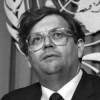David Lange

David Lange
David Russell Lange ONZ CHserved as the 32nd Prime Minister of New Zealand from 1984 to 1989. He headed New Zealand's fourth Labour Government, one of the most reforming administrations in his country's history, but one which did not always conform to traditional expectations of a social-democrat party. He had a reputation for cutting witand eloquence. His government implemented far-reaching free-market reforms. Helen Clark described New Zealand's nuclear-free legislation as his legacy...
NationalityNew Zealander
ProfessionPolitician
Date of Birth4 August 1942
An itinerant masseur, massaging the politically erogenous zones.
After that, whenever I drove past Mangakahia, I would empty my ashtray - and I was a heavy smoker in those days - on the road outside the hall.
Greens are not expected to be anything but nice.
My back is so scar-tissued that you couldn't find a place to slip a knife.
Bassett was a member of parliament and a cousin on my father's side of the family. My father delivered him and it became plain in later days that he must have dropped him.
Lange was hosting a reception at Vogel House for the Chinese politician Hu Yao Bang when the lights went out. Lange immediately asked all the guests to raise their hands because "many hands make light work." The audience complied, and to their amazement the lights immediately came back on. Lange was invited to visit China.
On a trip to Germany, Lange and his entourage were climbing the tower of an ancient castle when they stopped to catch their breath. "How old is this ruin?" someone asked a guide. "Forty-two years," said Lange.
Today's Schools are not Tomorrows Schools. That's a fundamental misconception.
Our nuclear free status means that we decline to acquiesce in the strategies of nuclear deterrence. We will not turn a blind eye to them, and pretend that the weapons are no longer a threat. We will not in any way tolerate the testing of nuclear weapons, or their manufacture, or their deployment.
Will the United States pull the rug on New Zealand? The answer is no. They might polish the lino a bit harder and hope that I execute a rather unseemly glide across it.
I've got two shirts still missing from the Bahamas. I'm sure they are part of a youth camping programme somewhere in Tanzania by now.
Our nuclear free status is a statement of our belief that we and our fellow human beings can build the institutions which will one day allow us all to renounce the weapons of mass destruction. We are a small country and what we can do is limited. But in this as in every other great issue, we have to start somewhere.
Money motivates. The goals (in the public sector) are more about service than money,
They told me, 'Don't bargain with the prices,' ... They wanted the best of everything. I was surprised. I didn't know they'd have a budget like Guangzhou or Beijing.